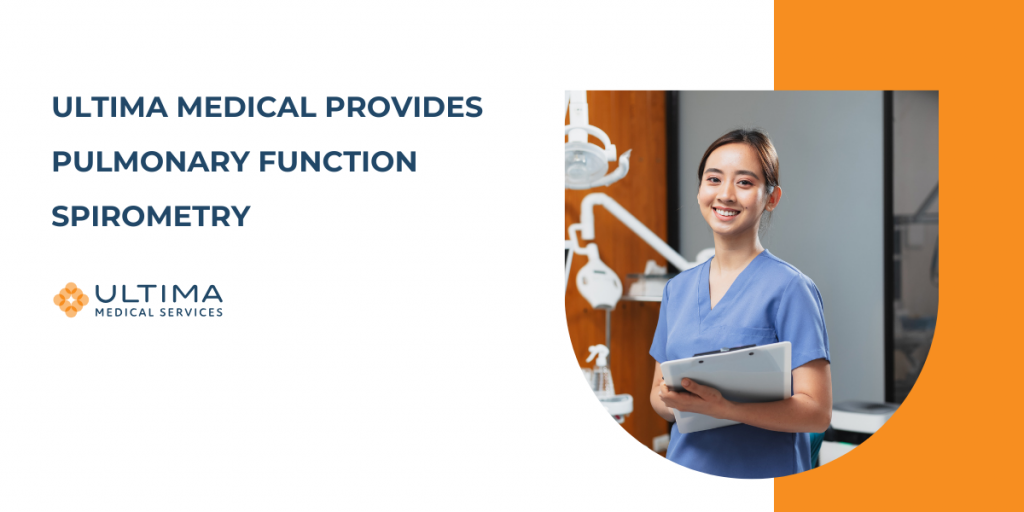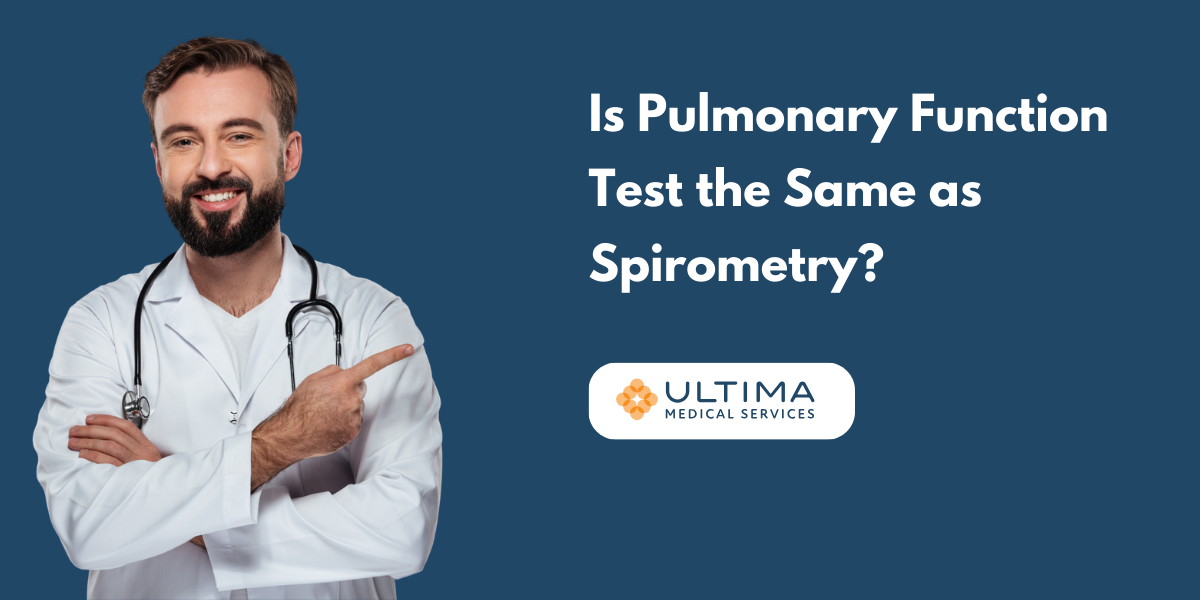Lung health is critical for overall well-being. Regular assessments help ensure that any potential issues are identified and managed promptly. Pulmonary function tests (PFTs) and spirometry are two commonly used methods to evaluate lung function. While these terms are often used interchangeably, they refer to different aspects of lung function assessment. In this blog, we will explore what pulmonary function tests and spirometry are, their similarities and differences, and how Ultima Medical Services can assist you with these important tests.
What is a Pulmonary Function Test?
Pulmonary function tests (PFTs) are a group of non-invasive tests that measure how well your lungs are working. These tests assess lung volume, capacity, rates of flow, and gas exchange. PFTs help in diagnosing various respiratory conditions, monitoring disease progression, and evaluating the effectiveness of treatment.
The primary purpose of PFTs is to determine how much air your lungs can hold. How quickly you can move air in and out of your lungs. Lastly how well your lungs can absorb oxygen and expel carbon dioxide. PFTs are used to diagnose conditions such as asthma, chronic obstructive pulmonary disease (COPD), pulmonary fibrosis, and other disorders that affect breathing.
Several types of tests fall under the category of PFTs, including spirometry, lung volume tests, gas diffusion tests, and cardiopulmonary exercise tests. Each of these tests provides different information about lung function and helps healthcare providers make informed decisions about diagnosis and treatment.
What is Spirometry?
Spirometry is one of the most common and essential pulmonary function tests. It specifically measures the amount and speed of air that you can inhale and exhale. The test involves breathing into a device called a spirometer, which records the volume and rate of air movement.
During a spirometry test, you will be asked to take a deep breath and then exhale forcefully into the spirometer. The device measures two critical parameters: Forced Vital Capacity (FVC) and Forced Expiratory Volume in one second (FEV1). FVC is the total amount of air exhaled during the test, while FEV1 is the amount of air exhaled in the first second of the FVC maneuver.
Spirometry is used to diagnose and monitor conditions like asthma, COPD, and other respiratory disorders. It is a quick, simple, and non-invasive test that provides valuable information about lung function. The results can help healthcare providers determine the severity of a lung condition and monitor the effectiveness of treatment.
Pulmonary Function Test vs. Spirometry: Similarities & Differences
Understanding the similarities and differences between these two is crucial for a comprehensive view of lung health assessment.
Similarities
- Purpose: Both PFTs and spirometry tests are used to assess lung function and diagnose respiratory conditions.
- Non-invasive: Both tests are non-invasive and involve breathing maneuvers to measure lung function.
- Diagnostic and Monitoring Tool: Both tests are used for diagnosing lung diseases and monitoring the progress of respiratory conditions and the effectiveness of treatments.
- Performed by Trained Professionals: Both tests are conducted by trained healthcare professionals, ensuring accuracy and reliability.
Differences
- Scope: Spirometry focuses specifically on measuring the volume and speed of air that can be inhaled and exhaled. In contrast, PFTs encompass a broader range of tests that evaluate various aspects of lung function, including lung volumes, gas exchange, and respiratory muscle strength.
- Parameters Measured: Spirometry measures FVC and FEV1, providing information about airflow obstruction and lung capacity. Other PFTs, such as lung volume tests and gas diffusion tests, measure different parameters like total lung capacity, residual volume, and the ability of the lungs to transfer gases.
- Complexity and Equipment: Spirometry is relatively simple and requires a spirometer, whereas other PFTs might involve more complex procedures and equipment, such as body plethysmographs or gas analyzers.
- Clinical Application: Spirometry is often the first test conducted to evaluate lung function and is commonly used in primary care settings. Other PFTs are usually performed in specialized pulmonary function laboratories and provide a more comprehensive assessment of lung health.

Ultima Medical Provides Pulmonary Function Spirometry Tests In BC
At Ultima Medical Services, we are dedicated to providing top-quality pulmonary function testing, including spirometry for occupational health assessments. Our recent accreditation by the BC College of Physicians & Surgeons Diagnostic Accreditation Program (DAP) ensures that our services meet the highest standards of care and accuracy.
Scheduling and Preparation
You can easily schedule a spirometry test by contacting us. Our team will provide you with detailed instructions on how to prepare for the test, including guidelines on medications, diet, and lifestyle adjustments.
Test Procedure
On the day of the test, you will be greeted by our friendly and professional staff. The test itself takes about 15 minutes and is performed by an accredited Medical Office Assistant (MOA). You will be asked to sit comfortably, wear a nose clip, and breathe into the spirometer following specific instructions.
Results Interpretation
The data collected during the spirometry test is interpreted by our accredited Occupational Health Physicians. They will analyze the results and provide you with a comprehensive report detailing your lung function.
Follow-Up and Support
Based on your results, our healthcare team will discuss the findings with you and recommend any necessary follow-up tests or treatments. We are committed to supporting you in maintaining optimal lung health and managing any respiratory conditions effectively.
In conclusion, while spirometry is a crucial component of pulmonary function testing, it is just one part of a broader range of tests that assess lung health. Understanding the differences and similarities between PFTs and spirometry helps in appreciating their roles in diagnosing and monitoring respiratory conditions. At Ultima Medical Services, we take pride in offering accredited pulmonary function spirometry tests to help you maintain and improve your lung health. If you have any concerns about your respiratory health or need a lung function assessment, don’t hesitate to contact us. Your lung health is our priority, and we are here to provide the care and support you need.


